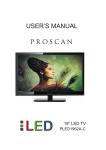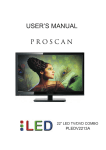Download Sears PLDED3273A-B User`s manual
Transcript
USER’S MANUAL 32” LED TV PLDED3273A-B Contents Introduction Warning Caution Important Information Attaching or Removing the Stand Installing Batteries to the Remote Control Identifying Front and Rear Panel Connection Suggestion Main Unit Description Remote Control OSD Basic Adjustment How Do I Clean The TV Troubleshooting Specifications FCC Compliance Statement 1 Introduction Thank you very much for purchasing your LED TV. It serves as a normal colour TV and a PC monitor. To enjoy your set fully from the very beginning, read this manual carefully and keep it handy for future reference. INSTALLATION ① Locate the receiver in the room where direct light does not strike the screen. Total darkness or a reflection on the picture screen can cause eyestrain. Soft and indirect lighting is recommended for comfortable viewing. ② Allow enough space between the receiver and the wall to permit ventilation. ③ Avoid excessively warm locations to prevent possible damage to the cabinet or premature component failure. ④ This TV can be connected to AC 100-240V~ 50/60HZ. ⑤ Do not install the TV in a location near heat sources such as radiators, air ducts, direct sunlight, or in closed compartments and closed areas. Do not cover the ventilation openings when using the TV. 6 The indicator light will last for about 30 seconds after the power has been turned off. Wait until the indicator light goes out before repowering the TV. 2 Warning CAUTION RISK OF ELECTRIC SHOCK DO NOT OPEN CAUTION: TO AVOID THE RISK OF ELECTRIC SHOCK. DO NOT REMOVE COVER (OR BACK). NO USER- SERVICEABLE PARTS INSIDE. REFER SERVICING TO QUALIFIED SERVICE PERSONNEL. This symbol is intended to alert the user to avoid the risk of electric shock. This equipment may only be disassembled by qualified service personnel. This symbol is intended to alert the user to the presence of important operation and maintenance instructions in the literature accompanying the equipment. 3 Caution Caution - High voltages are used in the operation of this product. Do not open the product's casing. Refer servicing to qualified service personnel . Caution To prevent fire or electrical shock hazard, do not expose the main unit to rain or moisture,do not place objects filled with liquids, such as vases, on the apparatus. Caution Do not drop or push objects into the television cabinet slots or openings. Never spill any kind of liquid on the television receiver. Caution Avoid exposing the main unit to direct sunlight and other sources of heat. Do not stand the television receiver directly on other products which give off heat: e. g. video cassette players and audio amplifiers. Do not block the ventilation holes in the back cover. Ventilation is essential to prevent failure of electrical components. Do not squash the power supply cord under the main unit or other heavy objects. 4 Caution Caution Never stand on, lean on or suddenly push the product or its stand. You should pay special attention to children. Caution Do not place the main unit on an unstable cart stand, shelf or table. Serious injury to an individual and damage to the television may result if it should fall. Caution When the product is not used for an extended period of time, it is advisable to disconnect the AC power from the AC outlet. Caution The LED panel used in this product is made of glass and is therefore breakable. This product must not be dropped or banged. If the LED Panel breaks be careful of being injured by broken glass. 5 Important Information Television Antenna Connection Protection External Television Antenna Grounding If an outside antenna or cable system is to be connected to the TV, make sure that the antenna or cable system is electrically grounded to provide some protection against voltage surges and static charges. Article 810 of the National Electrical Code, ANSI/NFPSA 70, provides information with regard to proper grounding of the mast and supporting structure, grounding of the lead-in wire to an antenna discharge unit, size of the grounding conductors, location of antenna discharge unit, connection to grounding electrodes, and requirements of the grounding electrode. Lightning Protection For added protection of the TV during a lightning storm or when it is left unattended or unused for long periods of time, unplug the TV from the wall outlet and disconnect the antenna or cable system. Power Lines Do not locate the antenna near overhead light or power circuits, or where it could fall into such power lines or circuits. 6 Attaching or Removing the Stand 1. To attach the base place the display unit flat on a table. Afterwards attach the stand onto the bottom of the stand. Screw in the 4 screws to secure the stand. 7 2. To remove the stand, remove the 4 screws in the area and the stand will come off. Installing Batteries to the Remote Control Please insert two AAA batteries into the remote control. Make sure that you match the (+) and (-) symbols on the batteries with the (+) and (-) symbols inside the battery compartment. Afterwards, re-attach the battery cover. Please note: Only use AAA batteries. Do not mix new and old batteries. This may result in cracking or leakage that may pose a fire risk or lead to personal injury. Inserting the batteries incorrectly may also result in cracking or leakage that may pose a fire risk or lead to personal injury. Dispose the batteries in accordance with local laws and regulations. Keep the batteries away from children and pets. If the remote control is not used for a long time, remove the batteries. Keep the remote control away from moisture, sunlight, and high temperatures. 8 Identifying Front and Rear Panel Front View INDICATOR LIGHT – The light is red when power is plugged in but the TV is not turned on. The light turns blue when the TV is turned on. Because of the LED in the panel, the TV might take 10 – 12 seconds to power on. REMOTE SENSOR – The remote sensor receives all the commands from the remote control. Rear View Mounting Pattern Mounting Specification : 100mm x 100mm using screw size M6. Length of screw should not exceed 8mm. Please Note : The 8mm length of screw refers to how deep the screw can go inside the mounting holes. When you’re buying screws, you should add the original 8mm to the thickness of your mounting plate in order to get the total screw length. 9 Connection Suggestions If You Have Digital Cable without Cable Box or Antenna… 1. 2. 3. 4. Make sure the power of HDTV is turned off. Connect the Coaxial RF cable from your antenna or digital cable to the TV port on the back of your HDTV. Turn on the HDTV. Follow the first time on screen instructions. Please Note: Not all broadcasts are in High Definition (HD). Please refer to your local broadcasting stations for more information. The HDTV’s tuner is designed for HDTV therefore requires a stronger signal than normal TVs. If you cannot achieve that signal level with your antenna or cable, your HDTV might lose picture or sound. 10 Connecting DVD Player with Component YPbPr… 1. Make sure the power of HDTV and your DVD player is turned off. 2. Obtain a Component Cable. Connect the green color connector to both your DVD player and YPbPr’s green connector port on the back of your HDTV. 3. Connect the blue color connector to both your DVD player and YPbPr’s blue connector port on the back of your HDTV. 4. Connect the red color connector to both your DVD player and YPbPr’s red connector port on the back of your HDTV. 5. Obtain a RCA Audio Cable. Connect the white color connector to both your DVD player and YPbPr’s white connector port on the back of your HDTV. 6. Connect the red color connector to both your DVD player and YPbPr’s red connector port on the back of your HDTV. 7. Turn on the HDTV and your DVD player. 8. Use the remote control’s source button or the source button on the TV to switch to YPbPr. Please Note : Sometimes DVD players will not automatically output to YPbPr. You will need to configure your DVD player with AV connection first then switch to YPbPr. Please reference the DVD player’s manual, to make sure the DVD player is configured to output correctly to the TV. This source shares audio jacks with composite video. 11 Connecting Wii™ with Composite… 1. 2. 3. 4. 5. 6. Make sure the power of HDTV and your Wii™ is turned off. Obtain a Yellow Video Cable. Connect the Yellow Video connector to both your Wii™ and AV’s Yellow Video connector port on the back side of your HDTV. Obtain a RCA Audio Cable. Connect the white color connector to both your Wii™ and AV’s white connector port on the back side of your HDTV. Connect the red color connector to both your Wii™ and AV’s red connector port on the back side of your HDTV. Turn on the HDTV and your Wii™. Use the remote control’s source button or the source button on the TV to switch to AV. Please Note: Make sure to read your Wii™ installation guide for further information. This source shares audio jacks with YPbPr. 12 Connecting Cable or Satellite boxes with HDMI… 1. Make sure the power of HDTV and your set-top box is turned off. 2. Connect a HDMI cable to the HDMI output of your set-top box and the other end to the HDMI port on the back of your HDTV. 3. Turn on the HDTV and your set-top box. 4. Use the remote control’s source button or the source button on the TV to switch to HDMI. Please Note: Please reference the set-top box’s manual, to make sure the set-top box is configured to output correctly to the TV. HDTV supports NEC’s universal remote code. Please look up NEC’s codes in your universal remote’s hand book. 13 Connecting to a PC with VGA and 3.5 mm minijack … 1. Make sure the power of HDTV and your PC is turned off. 2. Obtain a 15-pin D-Sub VGA cable; connect to the VGA output of your PC and the other end to the VGA port on the back of your HDTV. 3. Obtain a 3.5 mm Mini-jack, connect to the audio out of your PC and the other end to the VGA Stereo Input port. 4. Turn on the power of the HDTV and your PC. 5. Use the remote control’s source button or the source button on the TV to switch to PC. 6. Change your PC resolution to 1360x768 at 60hz refresh rate. 7. Press MENU to use the OSD’s PICTURE option. 8. Under the PICTURE option select PC Settings. 9. Under PC Settings use AUTO ADJUST to adjust the screen. Please Note: For the best results, please set your PC resolution to 1360x768 at 60 Hz. Please refer to the PC or graphic card’s manual for further instructions on how to set your resolution and refresh rate. Please refer to your PC manual for video output requirements of the video card. The VGA port of the TV features a power saving mode which will automatically turn off the TV, if there’s no signal provided for more than 5 minutes. 14 Connecting a Digital Audio Receiver with Coax SPDIF… 1. 2. 3. Make sure the power of HDTV and your receiver is turned off. Obtain a coax SPDIF cable, connect it to your receiver’s coax SPDIF digital input and the coax SPDIF connection on the LINE OUT port on the back of the HDTV. Turn on the HDTV and your receiver. Please Note: If you want pure digital stream for your receiver to decode, you must also configure the TV’s OSD Sound->Digital Audio Out function. Make sure the option is on 5.1CH. If your receiver is making static noises when receiving 5.1CH, you must use the PCM option instead. Please reference the receiver’s manual as well, to make sure the receiver is configured to receive signals correctly from the TV. The TV’s SPDIF out for 5.1CH is ONLY used for antenna/cable connection. Any other incoming audio signal will be passed out of SPDIF in PCM format. 15 Main unit description Control Panel Button Function VOL+ : Volume up. VOL- : Volume down. CH+ : TV channel up. CH- : TV channel down. MENU : Press to select the main menu. TV/AV : Select the input signal. POWER : Switch on when at standby mode or enter the standby mode. TV Terminal Connections 1. Coaxial out terminal. 2. RF antenna. 3. VGA input terminal of simulation signal of PC. 4. PC AUDIO input terminal. 5. Video input terminal. 6. AUDIO input terminal (used for Video & Y,Pb,Pr). 7. Component input terminal (Y,Pb,Pr). 8. HDMI1 input terminal. 9. HDMI2 input terminal. 10. HDMI3 input terminal 11. Line out terminal. 12. EARPHONE out terminal. 13. USB service terminal (For upgrading only). 16 Remote control POWER: Power on/off button, press once to turn the TV on and press again to turn the TV off. MUTE: Press this button to mute or restore sound. MTS/AUDIO: When stereo program is received, press this key to switch sound system between mono and stereo. When SAP program is received, press this button to switch sound system between mono and SAP When stereo and SAP program is received, press this key to switch among mono, stereo and SAP. Press this key to show the list of audio languages available for the current channel in ATSC. ASPECT: Press to adjust picture ratio. PMODE: Select picture mode. SMODE: Select sound mode. 0-9: Select and switch to a channel using 0 - 9. -/--: Switch the program digit. : Switch back and front between the current and previous channels. DISPLAY: Display TV information. EPG:Enter electronic program guide AUTO: Adjust the picture automatically in pc mode. RED, GREEN, YELLOW, CYAN: This button is not available. SLEEP: Set the sleep timer. SOURCE: Press to change signal source. ENTER: Enter the selected option or perform the selected operation. MENU: Press this button to enter the main menu. EXIT: Exit the OSD (On-screen display). CH+/CH-: Change the channel. CC: Press this key to select the CC ,ON or OFF mode and CC on Mute . INFO: Display some information of current program in TV mode. VOL+/VOL-: Adjust the volume. FAV: Switch between custom set "Favorite List" F.LIST: Press this key to display the Favorite List mode. C.LIST: Press this key to display the channel list mode. 17 Installation Guide Press MENU button to display the MAIN OSD MENU; Press ◄ / ►button to select the MENU you want; Press ENTER button to enter the sub menu; Press ▼ / ▲ button to select the option and then press ◄ / ► to adjust the value in the sub menu; You can press MENU button to go back to the upper menu or EXIT button to close the OSD. PICTURE You can select the type of picture, which best corresponds to your viewing. Press the “MENU” button to enter the OSD menu .Then press “/” button to select the “PICTURE” menu. 1. Press “” button to select “Picture Mode”, press “/” button to select. 2. Press “/” button to select “Contrast” and press the “/” button to enter contrast adjustment menu to adjust contrast. 3. Press “/” button to select “Brightness” and press the “/” button to enter brightness adjustment menu to adjust brightness. 4. Press “/” button to select “Color” and press the “/” button to enter color adjustment menu to adjust color. 5. Press “/” button to select “Tint” and press the “/” button to enter hue adjustment menu to adjust tint. Note: The 'Tint' item is used in NTSC mode only. 6. Press “/” button to select “Sharpness” and press the “/” button to enter sharpness adjustment menu to adjust sharpness. 7. Press “/” button to select “Color Temp” and press the “/” button to select. 8. Press “/” button to select “Blue Screen” and press “/” button to select "On" or "Off". 18 SOUND You can select the type of sound, which best corresponds to your listening. Press the “MENU” button to enter the OSD menu .Then press “/” button to select the “SOUND” menu. 1. 2. 3. 4. 5. 6. Press “” button to select “Sound Mode” and Press “/” button to select. Press “/” button to select “Bass” and press the “/” button to adjust. Press “/” button to select “Treble” and press the “/” button to adjust. Press “/” button to select “Balance” and press the “/” button to enter balance adjustment menu to adjust balance. Press “/” button to select “SPDIF Type”, then press “/” button to select the Audio output mode Note: The ' SPDIF Type ' item is used in DTV/HDMI mode only. Press “/” button to select “Audio Language”, then press “/” button to select the Language. Note: The ' Audio Language ' item is used in DTV mode only. TIME Press the “MENU” button to enter the OSD menu .Then press “/” button to select the “TIME” menu. 1. Press “” button to select “Sleep Timer” and press the “/” button to enter sleep timer adjustment menu to adjust sleep timer. 19 2. Press “/” button to select “Time Zone” and press the “/” button to enter time zone adjustment menu to select the local time zone. 3. Press “/” button to select “Daylight Saving Time” and press the “/” button to select “On” or “Off”. Note: The ' Daylight Saving Time ' item is used in DTV mode only. SETUP Press the “MENU” button to enter the OSD menu .Then press “/” button to select the “Setup” menu. 1. Press “” button to select “OSD Language” and press the “/” button to select the OSD language which you desire. 2. Press “/” button to elect “Transparency ” and press the “/” button to select. 3. Press “/” button to select “Zoom Mode” the “/” button to enter aspect ratio adjustment menu to adjust aspect ratio. 4. Press “/” button to select “Noise Reduction” and Press “/” button to select. 5. Press “/” button to select “Advanced” and Press “ENTER/” button to enter the sub-menu. (Only available in PC mode) A. Press “/” button to select “H-POS” and press the “/” button to adjust. B. Press “/” button to select “V-POS” and press the “/” button to adjust. C. Press “/” 20 button to select “Clock” and press the “/” button to adjust. D. Press “/” button to select “Phase” and press the “/” button to adjust. E. Press “/” button to select “Auto” menu and press the “” button to auto adjustment. 20 6. Press “/” button to elect “Closed Caption” the “ENTER/” button to enter the sub-menu. (Only available in TV mode) A.Press “/” button to select “CC Mode” and press the “/” button to adjust。 B.Press “/” button to select “Basic Selection” and press the “/” button to select CC1, CC2, CC3 , CC4, Text 1, Text 2, Text 3, Text 4. C.Press “/” button to select “Advanced Selection” and press the “/” button to adjust。 D.Press “/” button to select “Option” and press the “/” button to adjust。A Sub Menu will appear as below. 7. Press “/” button to select “DLC” and press the “/” button to select “On” or “Off”. 8. .Press “/” button to select “Reset Default”, then press “” a dialogue. Press “/” button selecting “Yes” to restore all setting to default setting. 21 LOCK Press the “MENU” button to enter the OSD menu .Then press “/” button to select the “Lock” menu. 1. Press “” button to select “Enter Password” and press select digital button to enter. Note: The default password is “0000” 2. Press ▼ / ▲ button to select Change Password, then press “” button to adjust the value. A Sub Menu will appear as below. If the password is changed, all of the passwords in the menu will be changed at the same time. Note: If you forget your password, you can use “8899” to enter any menu locked. 22 3. Press “/” button to select “System Lock” and press the “/” button to select “On” or “Off”. 4. Press “/” button to select “US” and press the “/” button to then press “/” button to select “TV”. A Sub Menu will appear as below. Press “/” button to select “MPAA” and press the “/”button to adjust. 5. Press “/” button to select “Canada” and press the “/” button to adjust. 6. Press “/” button to select “RRT Setting” and press the “/” button to adjust. A Sub Menu will appear. Note: Only the system detects the RRT information DTV stream, the choice can be select。 7. Press “/” button to select “Reset Setting”, then press “” a dialogue .Press “/” button selecting “Yes” to restore all setting to default setting. 23 Channel Press the “MENU” button to enter the OSD menu .Then press “/” button to select the “Channel” menu. 1. Press “” button to select “AIR/CLABLE ” and press the “/”button to select Cable or AIR. 2. Press “/” button to select “Auto Scan” and press the “ENTER/” button to enter, press“/” button to select “YES” and press “ENTER” to do auto search. 3. Press “/” button to select “Favorite” and press the “/” button to label the channel for favorite. 4. Press “/” button to select “Show/Hide” and press the “/” button to select. A Sub Menu will appear. 5. Press “/” button to select “Channel NO.” and press the “/”button to adjust. 24 6. Press “/” button to select “Channel Label” and press the “/” button to Rename label of the channel. A Sub Menu will appear as below. 7. “DTV Signal” Display the quality of current DTV signal. NOTE: This is not a choice. 25 How do I clean the TV? IMPORTANT 1. The power cable has to be removed from the socket before cleaning the TV. 2. Do not use volatile solvent (alcohol, rosin, and toluene) to clean the TV. These types of chemicals might damage the housing and the LCD glass. Cleaning the bezel and remote control 1. Use a 100% cotton cloth or micro-fiber cloth for cleaning. 2. If the remote control or bezel is dirty to the point where you cannot simply dry wipe it, please lightly dampen the wiping material (the wiping material cannot be dripping wet, because if water drips into the panel it will cause malfunction and possible permanent damage to the panel which will not be covered under the warranty) with clean water and wipe again. Wipe the display with a dry micro-fiber cloth or 100% cotton cloth afterwards. Please Note : Make sure you wring the water out of the cloth before cleaning the bezel or remote in order to prevent water from penetrating into the electronics. Cleaning the Screen 1. Use a 100% cotton cloth or micro-fiber cloth for cleaning. 2. The LCD screen glass is extremely fragile. Do not scrape it with any material. Do not press or tap the screen to avoid cracking. When the screen is dirty to the point where you cannot simply dry wipe it, please lightly dampen the wiping material with clean water and wipe again. Wipe the display with a dry micro-fiber cloth or 100% cotton cloth afterwards. 26 Troubleshooting The following table contains the common problems and the solutions to these problems. Please check this list before you contact the technicians. Problems Solutions Connect power cord correctly. Turn on power. NO PICTURE Connect video cable correctly. Select the input signal source with proper cable connection with the source button. ABNORMAL Match the colors on the cables to the ports off the back of the television. COLORS I.E. red cable to red colored port. PICTURE IS Adjust your contrast, brightness and lamp settings from the OSD Menu. TOO DARK For adjust controls AUDIO ONLY Make sure you have connected both your video and audio cables. NO PICTURE The TV’s tuner signal must not be lower than 65 %. PICTURE ONLY Make sure the audio cable is connected. NO AUDIO Readjust your volume via the remote control. REMOTE CONTROL DOES NOT WORK CANNOT RECEIVE SUFFICIENT CHANNELS THROUGH THE ATSC/NTSC TUNER The TV’s tuner signal must not be lower than 65 %. Turn off the TV, unplug it from the socket. Remove the batteries out of the remote for 30 minutes. Press the remote buttons and the power button randomly for a good 2 seconds, and then reinstall the batteries. Try the remote to see if it works. For battery removal instructions. The TV’s remote sensor is also housed in the same place as the power indicator light. Please make sure there is line of sight from the remote control’s front sensor to the remote sensor of the TV. The TV’s tuner signal must not be lower than 65 %. Change the direction of your antenna and rescan your channels. If you have cable call up your cable company and ask about signal strength of your local cable. Please adjust your picture setup and make sure the saturation and the RGB are not turned all the way down. For adjustment controls. NO COLOR The TV’s tuner signal must not be lower than 65 %. Check your signal. WEAK SIGNAL The TV’s tuner signal must not be lower than 65 %. Change the OR NO direction of your antenna and rescan your channels. If you have cable PROGRAM call up your cable company and ask about signal strength of your local SYMBOL ON cable. SCREEN TV’S This television follows NEC’s universal remote code. To find the UNIVERSAL actual code you must read through your own universal remote’s guide book. REMOTE CODE 27 Problems Solutions TV CHANNELS Check your auto lock function’s settings inside the OSD. You may have locked ARE BLOCKED up some channels but forgot about them. UNIVERSAL This TV follows NEC’s universal remote code. Please check your hand book REMOTE CODE for NEC’s codes then apply them. THE TV TURNS This TV is a High Definition liquid crystal display panel TV. It requires a few ON OR OFF more seconds than normal TVs to power up and show the picture. SLOWLY AND THE SCREEN SHOWS UP SLOWLY NO SOUND ON Make sure you have a 3.5 mm mini-jack cable connected from your pc’s sound PC output to the TV’s VGA STEREO INPUT. VIDEO Reboot your HDCP video device but turning them off and unplugging the power HDCP SAYS NO HDCP cord. Wait up to 8 minutes to plug the power back in to see if it works or not. SUPPORT Make sure you have a 3.5 mm mini-jack cable connected from your HDCP video VIDEO device’s sound output to the TV’s VGA STEREO INPUT. If your HDCP video HDCP HAS NO AUDIO device uses RCA AUDIO jacks, you’ll need to obtain a RCA audio converted into 3.5 mm mini-jack cable. GET Make sure the TV is recognized as plug and play monitor. Try updating your CANNOT 1360X768 ON PC video card’s drivers as well. If that does not help, most likely you’ll need to VGA upgrade your video card to a newer one. IS This might be from interference from large electrical appliances, cars, PICTURE DISTORTED OR motorcycles, or fluorescent lights. If the TV is close to the wall, try moving the HAS ABNORMAL TV to another room in your house to see if the problem still occurs. SOUND If you’re using HDMI or a TV digital channel make sure you use the ASPECT button to switch to 16:9 format. If you are using VGA, use the AUTO ADJUST function to adjust to the screen. Please Note : If you are using regular PICTURE DOES analog TV, AV, or component in 480i resolution, use the ASPECT button to NOT COVER THE switch to 16:9 in order to fill up the screen. Please Note : This note this feature ENTIRE SCREEN will distort the picture. 28 For best image quality, view HD widescreen programs where possible. If HD content is not available view “Standard Definition” from a digital source. PICTURE Standard, analog TV will always be noticeable inferior to HD because your TV IS has video that is many times better than old TV’s and so you can see interference QUALITY HORRIBLE!! and deficiencies you did not KNOW you had. HAS Your TV is manufactured using an extremely high level of precision technology, PICTURE PIXELS THAT however, sometimes some pixels of your TV may not display. Pixels defects ARE ALWAYS within industry specifications are inherent to this type of product and do not DISPLAYING constitute a defective product. THE SAME COLOR I CANNOT Your TV syncs time automatically according to your local TV channel. This CHANGE THE function only works while the TV’s tuner is connected to an ANTENNA. TIME MANUALLY BIG BLACK BOX You have turned on closed captioning and are using TEXT1 – TEXT4. Change IN THE MIDDLE the setting to CC1 or turn off closed captioning and the box will disappear. OF SCREEN 29 Problems Solutions SWITCHING A Different channels and inputs will sometimes have this effect because the CHANNEL OR channel signal’s own volume is already loud. There is no way remove this SOURCE completely. The TV has an AUTO VOLUME LEVEL function that can CHANGES THE combat this type of effect. Please make sure that function is turned on. VOLUME IS When your TV’s resolution is higher than the digital channel’s broadcast THERE NOISE OR resolution, the signal is up-converted to match your TV’s resolution. TRASH PIXELS Up-converting can cause this type of effect. ON THE SCREEN TIPS FOR HIGH The TV is an ideal platform for viewing High Definition Content. The best image quality can be achieved by HDMI, YPbPr (Component), then DEFINITION USERS VGA. However, due to variances in broadcast practices, it is possible some image distortions can occur. TIPS FOR Letterboxed (Widescreen) versions of DVD movies are most commonly LETTERBOX formatted for standard 4:3 TVs. The TV has the capability of expanding CONTENT this content so the entire screen is filled at the expense of the image USERS proportion. To use this function press the aspect button on the remote control and cycle among the available options. I CANNOT FIND The buttons are represented by the ▲▼◄► buttons located on the remote THE VOLUME control. ▲▼ changes the channels and ◄► changes the volume. AND CHANNEL CHANGING BUTTONS TV TURNS OFF The TV features a power saving mode which will automatically turn off the AUTOMATICAL TV, if there’s no signal provided for more than 5 minutes. LY AFTER 5 MINUTES TV Check to see if you are under POWER SAVING mode for your picture MY PICTURE IS mode. Keep pressing the PICTURE button on the remote control to cycle VERY DIM out of POWER SAVING. 30 Specifications Display panel Illustration Item Active Area / Screen Size Diagonal 32 inches Aspect Ratio Widescreen 16:9 Pixel Pitch 0.17 (H) x RGB x 0.51 (V) um per one triad Max. of Pixels (Resolution) HD (1366 x 768 pixels) resolution Brightness 250 nits (Typical) Contrast 1200:1 (Typical) with Auto Contrast Enhancement Response Time 8 ms (gray to gray) Viewing Angle Lamp Life of Backlight Typical 178/178 Degree (Horizontal/Vertical) > 30,000hrs TV DISPLAY 29.05” x 17.488” x 3.74” (without stand) Dimension 29.05” x 19.496” x 8.263” (with stand) Weight 18.95 lbs Power input AC 100 – 240V, 60/50 Hz, 3A(Max.) Function (1)Video De-interlace 3D Frame recover 3:2 Noise reducing core technology 3D Aspect ratio Wide, Normal, Cinema, Zoom Gamma Fixed Gamma Lamp adjust Yes Picture mode Standard / Mild / Power Saving / User/Vivid Video adjust Brightness / Contrast / Color / Tint / Sharpness 31 (2)Audio Sound Mode Dynamic/Standard/Soft/User Auto Volume Control Yes Tone Bass / Treble / Balance COAXIAL Out Yes (coax) Speakers 6 watt per channel (3) General Hybrid TV Tuner NTSC / ATSC / QAM (Digital Cable Ready) Channel auto scan Yes Sleep timer Off/10mins/20mins/30mins/40mins/50mins/60mins/90mins/120mins Standby power Under 1W Timing support-Video 480i / 480p / 720p / 1080i / 1080p 1360*768@60 Hz (NATIVE) 1024*768@60 PC timing 800*600@60 640*480@60 720x400@70 (4)NTSC/ATSC Sound: Mono / Stereo / SAP Favorite Channel NTSC V-chip Closed caption (CC1-CC4, Text 1-Text 4) Favorite Channel V-chip Video input format: 1080i, 720p, 480p, 480i ATSC Analog closed caption: (CC1-CC4, Text 1-Text 4) Digital closed caption: (Service 1-Service 6) (5)I/O 1 input x TV Tuner (NTSC/ATSC), 1 input x AV, 1 input x YPbPr(audio shared with AV) 3 inputs x HDMI/HDCP (optional, HDCP audio shared with VGA Audio In), 1 input x VGA, 1 input x VGA Audio In, 1 output x COAXIAL (digital audio) out, 1 output x Audio Left/Right out 1 output x Headphone out, *The product’s specifications may change without notice or obligation. **This manual’s pictures and words are for references only and are subject to change without notice or obligation. 32 FCC Compliance Statement This device complies with Part 15 of the FCC Rules. Operation is subject to the following conditions: This device may not cause harmful interference This device must accept any interference received, including interference that my cause undesired operation. Please Note: This equipment has been tested and found to comply with the limits for a Class B digital device, pursuant to part 15 of the FCC Rules. These limits are designed to provide reasonable protection against harmful interference in a residential installation. This equipment generates uses and can radiate radio frequency energy and, if not installed and used in accordance with the instructions, may cause harmful interference to radio communications. However, there is no guarantee that interference will not occur in a particular installation. If this equipment does cause harmful interference to radio or television reception, which can be determined by turning the equipment off and on, the user is encouraged to try to correct the interference by one or more of the following measures: Reorient or relocate the receiving antenna. Increase the separation between the equipment and the receiver. Connect the equipment into an outlet on a circuit different from that to which the receiver is connected. Caution: To comply with the limits for an FCC Class B computing device, always use the signal cord and power cord supplied with this unit. The Federal communications Commission warns that changes or modifications to the unit not expressly approved by the party responsible for compliance could void the user’s authority to operate the equipment. 33











































